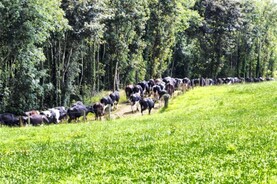The US Department of Agriculture’s Animal and Plant Health Inspection Service (APHIS) has opened a 60-day consultation period on a proposed revised rule lifting the ban on sheep and goat products from countries considered at risk of transmissible spongiform encephalopathies (TSEs) such as BSE and scrapie.
This includes any country that does not hold BSE negligible risk status - briefly achieved by Ireland last year before a BSE case in Co Louth caused its loss a few days later.
It has been shown that sheep and goats and other small ruminants pose a minimal risk of spreading the BSE disease agent
The US imposed the ban when links between TSEs in various species were not as well known as they are today.
“Because it has been shown that sheep and goats and other small ruminants pose a minimal risk of spreading the BSE disease agent, APHIS is proposing to remove the current BSE-related restrictions on imports of live domestic sheep, goats and small ruminants, as well as most sheep and goat products,” APHIS said in its consultation documents.
According to the agency, the restrictions have disrupted trade and caused economic hardship for US producers seeking to introduce new genetics into their flocks and herd, and lifting them would provide greater opportunity for US producers and consumers.
Minister for Agriculture Michael Creed welcomed the decision and said in a statement: “While it is still early in the process, it does potentially provide an opportunity for Ireland to penetrate a sector of the US lamb market which can reward top quality, sustainably produced sheepmeat and add the US to the list of third-country markets buying Irish product. The onus now is on the Irish sheepmeat sector to prove its credentials in areas such as traceability and secure market access as soon as the decision is formalised. This will be no easy task.”
Should the revised US rule be adopted after consultation, Ireland will need to secure veterinary approval before individual factories are approved for export. Some protein products considered to pose a higher risk remain banned under the proposed rule.
“The publication of the TSE rule is a first step only and our priority now is to submit the necessary technical documentation as early as possible,’’ said Minister Creed. “In the same way as we secured first mover advantage on the beef market access, we will be hoping to do the same on sheepmeat when the time comes.”
Read more
Irish get access to US manufacturing beef
The US Department of Agriculture’s Animal and Plant Health Inspection Service (APHIS) has opened a 60-day consultation period on a proposed revised rule lifting the ban on sheep and goat products from countries considered at risk of transmissible spongiform encephalopathies (TSEs) such as BSE and scrapie.
This includes any country that does not hold BSE negligible risk status - briefly achieved by Ireland last year before a BSE case in Co Louth caused its loss a few days later.
It has been shown that sheep and goats and other small ruminants pose a minimal risk of spreading the BSE disease agent
The US imposed the ban when links between TSEs in various species were not as well known as they are today.
“Because it has been shown that sheep and goats and other small ruminants pose a minimal risk of spreading the BSE disease agent, APHIS is proposing to remove the current BSE-related restrictions on imports of live domestic sheep, goats and small ruminants, as well as most sheep and goat products,” APHIS said in its consultation documents.
According to the agency, the restrictions have disrupted trade and caused economic hardship for US producers seeking to introduce new genetics into their flocks and herd, and lifting them would provide greater opportunity for US producers and consumers.
Minister for Agriculture Michael Creed welcomed the decision and said in a statement: “While it is still early in the process, it does potentially provide an opportunity for Ireland to penetrate a sector of the US lamb market which can reward top quality, sustainably produced sheepmeat and add the US to the list of third-country markets buying Irish product. The onus now is on the Irish sheepmeat sector to prove its credentials in areas such as traceability and secure market access as soon as the decision is formalised. This will be no easy task.”
Should the revised US rule be adopted after consultation, Ireland will need to secure veterinary approval before individual factories are approved for export. Some protein products considered to pose a higher risk remain banned under the proposed rule.
“The publication of the TSE rule is a first step only and our priority now is to submit the necessary technical documentation as early as possible,’’ said Minister Creed. “In the same way as we secured first mover advantage on the beef market access, we will be hoping to do the same on sheepmeat when the time comes.”
Read more
Irish get access to US manufacturing beef







 This is a subscriber-only article
This is a subscriber-only article










SHARING OPTIONS: